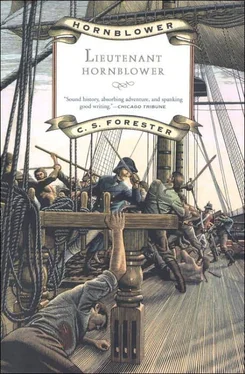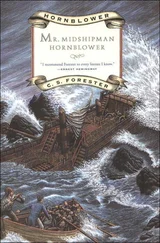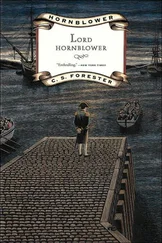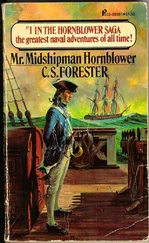“A bad day to be out without your peajacket,” he said.
“Yes,” said Hornblower.
He clipped that affirmative a little short, so that in a minute degree it failed to be an indifferent, flat agreement. It was that which caused Bush to realise that it was not eccentricity or absentmindedness that had brought Hornblower out into a black frost without his greatcoat. Bush looked at Hornblower sharply, and he might even have asked a tactless question if he had not been forestalled by the opening of an inner door beside them. A short, plump, but exceedingly elegant gentleman came in; he was dressed in the height of fashion, save that he wore his hair long, tied back and with powder in the style of the last generation. This made his age hard to guess. He looked at the pair of them with keen dark eyes.
“Good morning, Marquis,” said Hornblower. “It is a pleasure to present—M. le Marquis de SainteCroix—Lieutenant Bush.”
The Marquis bowed gracefully, and Bush endeavoured to imitate him. But for all that graceful bow, Bush was quite aware of the considering eyes running over him. A lieutenant looking over a likely hand, or a farmer looking at a pig at a fair, might have worn the same expression. Bush guessed that the Marquis was making a mental estimate as to how much Bush might be good for at the card tables, and suddenly became acutely conscious of his shabby uniform. Apparently the Marquis reached the same conclusion as Bush did, but he began a conversation nevertheless.
“A bitter wind,” he said.
“Yes,” said Bush.
“It will be rough in the Channel,” went on the Marquis, politely raising a professional topic.
“Indeed it will,” agreed Bush.
“And no ships will come in from the westward.”
“You can be sure of that.”
The Marquis spoke excellent English. He turned to Hornblower.
“Have you seen Mr. Truelove lately?” he asked.
“No,” said Hornblower. “But I met Mr. Wilson.”
Truelove and Wilson were names familiar to Bush; they were the most famous prize agents in England—a quarter of the navy at least employed that firm to dispose of their captures for them. The Marquis turned back to Bush.
“I hope you have been fortunate in the matter of prize money, Mr. Bush?” he said.
“No such luck,” said Bush. His hundred pounds had gone in a two days’ debauch at Kingston.
“The sums they handle are fabulous, nothing less than fabulous. I understand the ship’s company of the Caradoc will share seventy thousand pounds when they come in.”
“Very likely,” said Bush. He had heard of the captures the Caradoc had made in the Bay of Biscay.
“But while this wind persists they must wait before enjoying their good fortune, poor fellows. They were not paid off on the conclusion of peace, but were ordered to Malta to assist in relieving the garrison. Now they are expected back daily.”
For an immigrant civilian the Marquis displayed a laudable interest in the affairs of the service. And he was consistently polite, as his next speech showed.
“I trust you will consider yourself at home here, Mr. Bush,” he said. “Now I hope you will pardon me, as I have much business to attend to.”
He withdrew through the curtained door, leaving Bush and Hornblower looking at each other.
“A queer customer,” said Bush.
“Not so queer when you come to know him,” said Hornblower.
The fire had warmed him by now, and there was a little colour in his cheeks.
“What do you do here?” asked Bush, curiosity finally overcoming his politeness.
“I play whist,” said Hornblower.
“Whist?”
All that Bush knew about whist was that it was a slow game favoured by intellectuals. When Bush gambled he preferred something with a greater element of chance and which did not make any demand on his thoughts.
“A good many men from the services drop in here for whist,” said Hornblower. “I’m always glad to make a fourth.”
“But I’d heard—”
Bush had heard of all sorts of other games being played in the Long Rooms: hazard, vingtetun, even roulette.
“The games for high stakes are played in there,” said Hornblower, pointing to the curtained door. “I stay here.”
“Wise man,” said Bush. But he was quite sure there was some further information that was being withheld from him. And he was not actuated by simple curiosity. The affection and the interest that he felt towards Hornblower drove him into further questioning.
“Do you win?” he asked.
“Frequently,” said Hornblower. “Enough to live.”
“But you have your half pay?” went on Bush.
Hornblower yielded in face of this persistence.
“No,” he said. “I’m not entitled.”
“Not entitled?” Bush’s voice rose a semitone. “But you’re a permanent lieutenant.”
“Yes. But I was a temporary commander. I drew three months’ full pay for that rank before the Admiralty refused to confirm.”
“And then they put you under stoppages?”
“Yes. Until I’ve repaid the excess.” Hornblower smiled; a nearly natural smile. “I’ve lived through two months of it. Only five more and I’ll be back on half pay.”
“Holy Peter!” said Bush.
Half pay was bad enough; it meant a life of constant care and economy, but one could live. Hornblower had nothing at all. Bush knew now why Hornblower had no greatcoat. He felt a sudden wave of anger. A recollection rose in his mind, as clear to his inward eye as this pleasant room was to his outward one. He remembered Hornblower swinging himself down, sword in hand, on to the deck of the Renown , plunging into a battle against odds which could only result in either death or victory. Hornblower, who had planned and worked endlessly to ensure success—and then had flung his life upon the board as a final stake; and today Hornblower was standing with chattering teeth trying to warm himself beside a fire by the charity of a frogeating gamblinghall keeper with the look of a dancing master.
“It’s a hellish outrage,” said Bush, and then he made his offer. He offered his money, even though he knew as he offered it that it meant most certainly that he would go hungry, and that his sisters, if not exactly hungry, would hardly have enough to eat. But Hornblower shook his head.
“Thank you,” he said. “I’ll never forget that. But I can’t accept it. You know that I couldn’t. But I’ll never cease to be grateful to you. I’m grateful in another way, too. You’ve brightened the world for me by saying that.”
Even in the face of Hornblower’s refusal Bush repeated his offer, and tried to press it, but Hornblower was firm in his refusal. Perhaps it was because Bush looked so downcast that Hornblower gave him some further information in the hope of cheering him up.
“Things aren’t as bad as they seem,” he said. “You don’t understand that I’m in receipt of regular pay—a permanent salarium from our friend the Marquis.”
“I didn’t know that,” said Bush.
“Half a guinea a week,” explained Hornblower. “Ten shilling and sixpence every Saturday morning, rain or shine.”
“And what do you have to do for it?” Bush’s half pay was more than twice that sum.
“I only have to play whist,” explained Hornblower. “Only that. From twelve midday until two in the morning I’m here to play whist with any three that need a fourth.”
“I see,” said Bush.
“The Marquis in his generosity also makes me free of these rooms I have no subscription to pay. No table money. And I can keep my winnings.”
“And pay your losses?”
Hornblower shrugged.
“Naturally. But the losses do not come as often as one might think. The reason’s simple enough. The whist players who find it hard to obtain partners and who are cold-shouldered by the others, are naturally the bad players. Strangely anxious to play, even so. And when the Marquis happens to be in here and Major Jones and Admiral Smith and Mr. Robinson are seeking a fourth while everyone seems strangely preoccupied he catches my eye—the sort of reproving look a wife might throw at a husband talking too loud at a dinner party—and I rise to my feet and offer to be the fourth. It is odd they are flattered to play with Hornblower, as often it costs them money.”
Читать дальше









